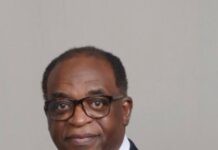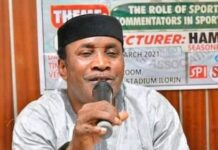 The hope of reclaiming Nigeria from May 29th is too high. Chief Emeka Anyaoku, a former Sec Gen of the Commonwealth said it is not because of General Muhammadu Buhari’s campaign promises but because of his character. This assertion reignites the debate over which form of government best suits Buhari’s character and which will best help the President-elect to economic recovery. The question is, will an authoritarian approach, with insensitive and austere choices help Buhari meet expectations, or will a liberal democrats approach, with built-in checks and balances, provide prosperity?
The hope of reclaiming Nigeria from May 29th is too high. Chief Emeka Anyaoku, a former Sec Gen of the Commonwealth said it is not because of General Muhammadu Buhari’s campaign promises but because of his character. This assertion reignites the debate over which form of government best suits Buhari’s character and which will best help the President-elect to economic recovery. The question is, will an authoritarian approach, with insensitive and austere choices help Buhari meet expectations, or will a liberal democrats approach, with built-in checks and balances, provide prosperity?
I say, as they say in Sweden, both and more. For example, in the 1980s, economic performance in Chile, under Gen. Augusto Pinochet and in Singapore, under the benign but authoritarian Lee Kuan Yew, was impressive, while industrialized democracies of Europe struggled with recession and stagnation. This gave birth, in Europe, to the term “Eurosclerosis.”
Appraising democracy under Buhari with its attendant vulnerability to growth-constraining primitive interests, one would opt for an authoritarian alternative as a tablet for Nigeria’s rejuvenation. As a military officer and disciplinarian, Buhari is unlikely to allow a pillaging of the economy, and is better positioned to implement hard economic policies. There is a precedent. The Buhari-Idiagbon regime of 1984-1985, was characterized by War Against Indiscipline, WAI. Then, people queued up for essential commodities, to ride buses and to see their doctor. People behaved.
However, knowing the stakeholders that would file against him, if he must succeed, Buhari must limit himself to only one term, groom his successors and select the right electoral umpires to sustain the momentum. No man is an island. The opposition Peoples Democratic Party, PDP, would have no option but to find alternatives to a system that works, which must be a system that works, even better, if they hope to regain power ever.
If there is one reason above all others that helps explain Nigeria’s economic collapse, armed conflict, political violence and comprehensive state inertia, it must be that tens of millions of hopeless youths are wandering like ghosts, unable to find jobs, while politicians are spending like money is running out of fashion. The supply of men, some as young as 9, into insurgency, criminal cults and militias is staggering, and that has given teeth to Buhari’s campaign gimmick of three million jobs yearly. Health-care delivery is another problem. Families have emptied their savings on the recovery of one sick member flown to Egypt, India, Europe or the US. And often, that relative winds up dead. Medical tourism, which is a new status kaleidoscope that differentiates the rich from the poor has eaten into Nigerians’ pockets and the nation’s resources. While our hospices remain consultancy clinics, our doctors and pharmacists’ greed has overflown beyond prescribing surgery for every headache to faking of drugs.
Worse still is the social plane. Here, Nigerians are most notorious. With over 120 private jets and more than ten on the presidential fleet, without a national carrier, amidst palpable poverty, profligacy is Nigeria’s other name. When unable to charter a rickety jet, public figures fly first class, always, at public expense. This manner in which wealth is displayed, especially by public servants, must be abridged.
It’s been said that a new code of conduct will be unveiled by Buhari on May 29th. If true, it must not forget that official conduct is the public enemy number one. It is painful that in Nigeria’s current despair its public officials plunder resources, to fly abroad for things as trivial as dry-cleaning their clothes. Our politicians, especially legislators, have become addicted to visa applications, leading one to believe that if they had their way, they would administer their offices from overseas.
Among the main reasons for this sad reality is that since the 1980s various governments have failed to establish a productive relationship between the education systems and our job markets. Government officials have blurred the thin line separating public coffers and personal bank accounts. This ability to steal with impunity is why politicians kill to get into office. The result has always been badly managed institutions, epileptic utilities, broken down infrastructure and overall poor service delivery.
Buhari must stamp his foot down. Many countries have done it. Nigeria can. Before the turn of the century, China has been unshaken and continues to wink at global economic downturns. This has attracted the imagination of leaders like Russia’s Vladimir Putin, Turkey’s Erdogan, Egypt’s Al-Sisi and Orban of Hungary to think that economic stability and sudden recovery begin with a temporary suspension of democracy. At 73, Buhari can join these great men, provided he forgets any desire for reelection. Jean-Claude Juncker, for example, now president of the European Commission, links non-performance with reelection when he once said, “we all know what to do, we just don’t know how to get re-elected after we’ve done it.” Buhari knows what to do. Nigerians have run out of patience. Leaders must shape up or ship out. The electorate has sacrificed for Buhari, it is his turn to sacrifice for Nigeria. It has always been said that statesmen think of the next generation while politicians think of the next election. Buhari is already a statesman. He must act like one.
The truth is that authoritarian systems push back insensitive politicians but are also unsustainable in the long run. People get tired and demand their freedom back. The challenge for Buhari is to develop mechanisms of policies that are sustainable in the long term while all along safeguarding the democratic process. He has earned the people’s confidence to do as he pleases in four years. He only has to ensure that cool-headed work is not undermined by our crises and do work that posterity will remember positively.


